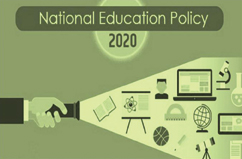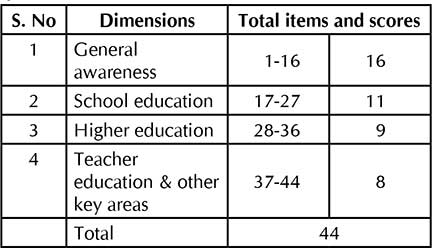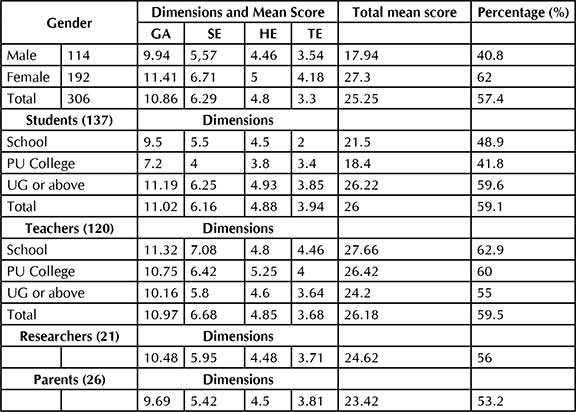Pratistha Agarwal and Venkata Krishna Bayineni
The National Education Policy 2020 (NEP 2020), approved by the union cabinet outlines the vision of a new education system. NEP 2020, replaces the National Policy on Education-1986 and is an inclusive framework focusing on education from the elementary level to higher education in the country. The main objective of our study was to find out the level of awareness about NEP 2020 among teachers, students, researchers and parents in Karnataka. The findings revealed that the awareness levels were average. We also studied the awareness levels according to the variable gender and variable strata of the sample, i.e., teachers, students, researchers and parents.

Introduction
As the objective of any education system is to benefit children so that no child loses an opportunity to learn and excel because of circumstances of birth or background, NEP 2020 has a target of 100 per cent Gross Enrolment Ratio (GER), in school education by 2030. The policy reaffirms that bridging social gaps in access, participation, and learning outcomes in school education will continue to be one of the major goals of all education sector development programs. Many governments and non-government surveys done in the last several years hinted at the precarious state of the ‘learning crisis’ in the country. However, a true picture emerged after a National Achievement Survey (NAS) was undertaken by the National Council of Educational Research and Training (NCERT), which was ably supported by the Ministry of Education. NEP 2020 was drafted by a 12-member committee headed by former ISRO chief, Dr. Krishnaswamy Kasturirangan. The committee worked on the policy for almost two years and submitted the draft in 2019. Between then and July 2020, it was reviewed and responded to by over 2.5 lakhs members in the education field. By now, the policy has been accepted by nearly eight Indian states, first being Karnataka. This survey was conducted in order to understand people’s awareness and knowledge of the same within Karnataka.
Objectives and significance of the study
The objectives of this study were to:
• Survey and spread awareness on the New Education Policy 2020 among the people of Karnataka.
• Compare participants’ awareness of the New Education Policy 2020 based on which stratum of the sample they belonged to.
• The survey gives us a peek into how much work has to be done to make different citizens realize the importance of the transformation that NEP 2020 is capable of.
Methods
Everyone needs to be aware of the proposed modifications and major reforms mentioned in NEP 2020. Students and teachers, as main stakeholders, need to know the focal areas, salient features and key ideas proposed in the policy. Therefore, it was decided to explore the understanding of this policy among teachers, researchers, parents and students. So, the target populations were students and teachers of schools and colleges, parents and researchers within Karnataka. Samples were chosen by incidental sampling, meaning the data was compiled based on those who were present at the time of research.
Multiple choice type questions were framed based on the NEP 2020 published in July 2020. As many as 44 questions were framed in all major areas. The questions were categorized into four sections: General Awareness: 16 questions, School Education: 11 questions, Higher Education: 9 and Teacher Education and Other Key Areas: 8 questions. The maximum possible score was 44 and there was no minimum score set as the purpose was to spread awareness. There were no negative markings.

The 44 questions (MCQs) were given to three education experts and college teachers to establish content validity. The feedback was adopted and MCQ’s were reorganized. To validate the final tool, a pilot study was conducted on a selected sample of 10 college students and 10 teachers.
The questions were created and administered via Google forms, an online platform. Details about the questionnaire were publicized through emails and various social media. An appreciation certificate was given to all the participants at the end of the survey. The individual scores were released later to the participants via emails.
Results and discussion
A total of 306 responses were received. Student participation was on the higher side. This meant that most of the people were aware of NEP 2020 at least as an idea and their participation in this survey was a reflection of their interest to know more about it.
Table 1: Distribution of questions in NEP awareness quiz

On a general note, it is found that the audience is adequately versed with the reforms to be brought about by NEP 2020. None of the categories of participants scored less than 53.2 per cent. All the categories scored almost the same, except for the inexplicable difference between the scores of male and female participants.
Highest awareness was found in the domain of General Awareness in all the participants going up to 11.02 among students, 10.97 among teachers, 10.48 and 9.67 among researchers and parents respectively. The total mean scores of students and teachers were nearly the same, 26 and 26.18 respectively. At the same time, it is interesting to observe that not much difference is seen between the scores of students and teachers in all the areas. This signifies the great level of involvement that the students and teachers of Karnataka are showing towards the new way of learning. It is significant because it is at the teachers’ and students’ level that the immediate connection and amends can be made with the learner.
Even though the total mean score of parents is comparable to the other categories, it is a little disappointing to observe that not many parents participated, which indirectly symbolizes that some work has to be done to induce parents’ involvement in their ward’s education.
Table 2: Scoring pattern amongst various participants

It is a must for everyone to know about NEP 2020, to be aware of where we are heading as a nation in the field of education, to know what to expect from the coming generation of learners. As receivers of old-school education, we need to constantly evolve to catch up with the new, bright minds. They will be even brighter once NEP 2020 is in its full-fledged implementation. Conducting seminars and workshops, joining hands with more educational institutions, Prayoga is making continuous efforts to make people aware and showcase what new generation learning is all about. There is a long way to go, but if we all participate, the path will get easier.
Acknowledgements: We are thankful to Prayoga Institute of Education Research, Bengaluru for providing support and required facilities. We also acknowledge the cooperation extended to us by Dr. H. S. Nagaraja, Dr. K S Nagabhushana and Mr. Vallish Herur during the validation phase.
Pratistha Agarwal is a Research Associate at Prayoga Institute of Education Research, Bengaluru. She currently works with the Department of Biology. She has developed a huge interest in Pedagogical Research in the field of science education. She also promotes science as a basic part of everyday life, and believing so, makes the teaching-learning process easier. She can be reached at pratistha.ag@prayga.org.in.
Dr. Venkata Krishna B is a Senior Researcher, currently working with the Department of Biology, Prayoga Institute of Education Research, Bengaluru. He is keen on exploring and experimenting with different learning approaches. He is currently working on different study areas of research pertaining to school-level Science learning. He can be reached at krishna.bayineni@prayoga.org.in.
